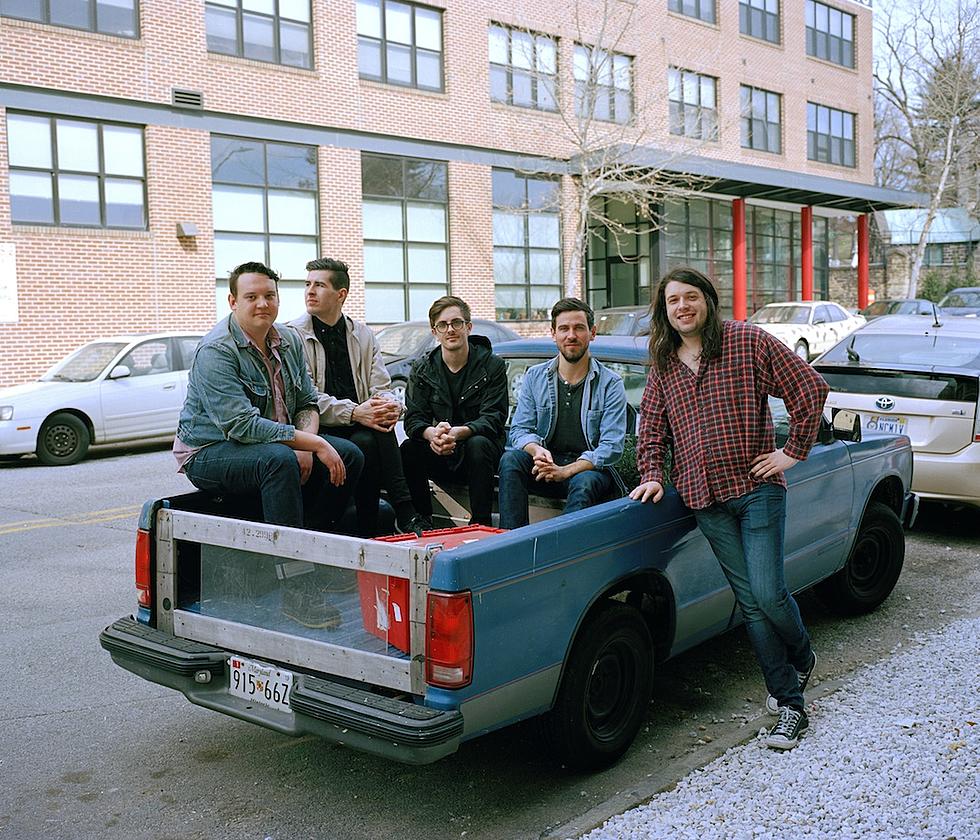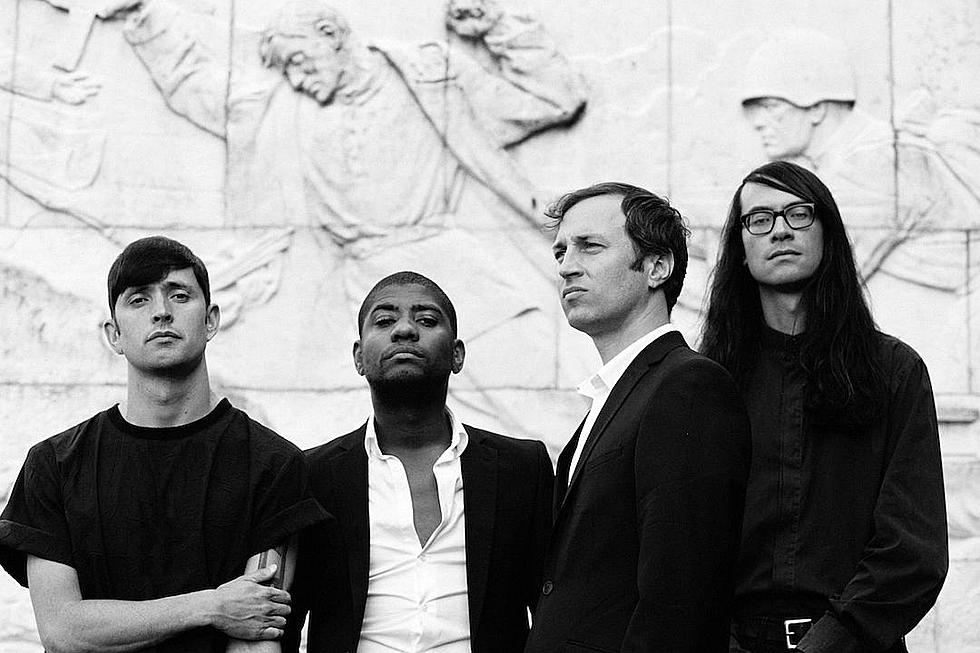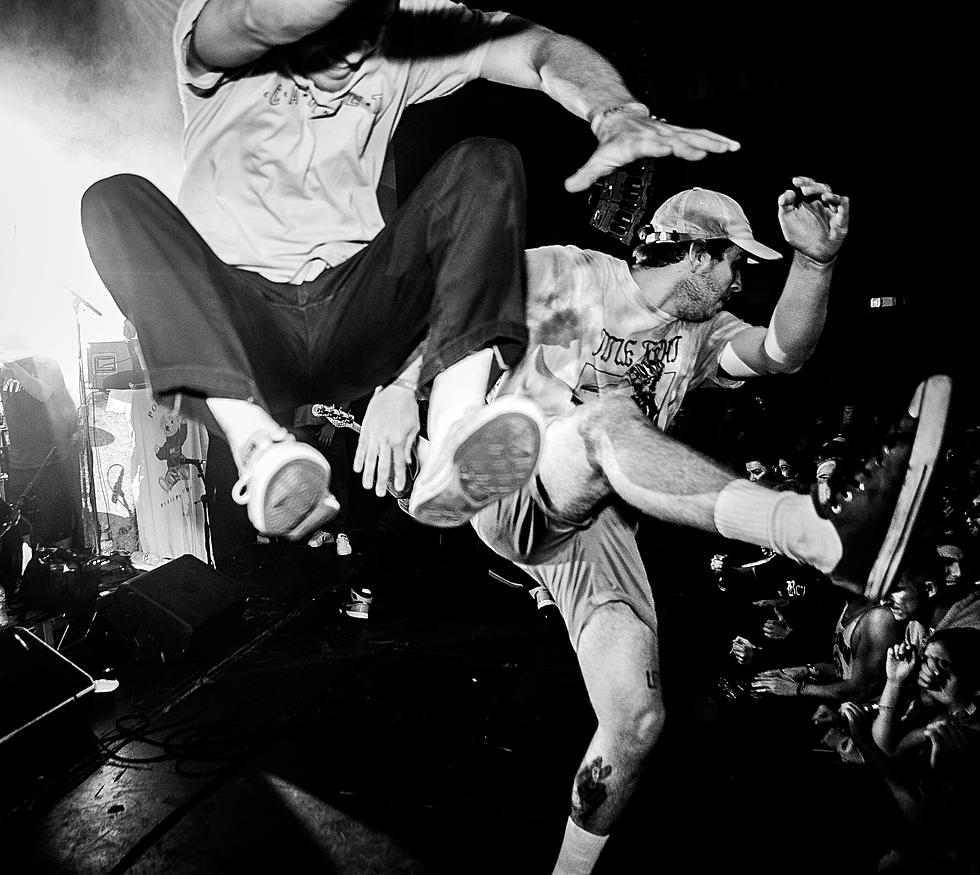
Witness the Rebirth of the Devil Wears Prada
In the span of three months, singer Mike Hranica has two major projects coming out. The first is Low Fire, the debut EP from his newest band God Alone. It's four tracks of moody and bluesy post-punk, made in his current home of Chicago. It's modest yet intricate rock, featuring gentle influences from the likes of Nick Cave and Shellac streaming through smoky guitar riffs. The month of August saw Hranica putting together the self-released EP, enjoying hands-on cassette and record packaging, working with his friends to make a quality, completely independent project stand out. He took the band out on tour, playing small clubs in the Midwest alongside lo-fi rock outfit Neaux, and Weekend Nachos' Andy Nelson's weird-grunge project, Belonger. In the month of September, God Alone will go into hibernation, while Hranica sees the release of his other album, Transit Blues on October 7, his sixth full-length as frontman for metalcore band the Devil Wears Prada.
Holding one record up to the next make them seem worlds apart upon first listen, but going deeper under the surface, the connection of intent and sincerity is abundantly clear. Transit Blues is the first full-length Prada record after the departure of longtime guitarist Chris Rubey and drummer Daniel Williams. While both members' contributions will be fondly remembered, the shift in personnel allowed the new blood to rejuvenate what a Prada song can do, taking a sledgehammer to any preconceptions, proving the band can work both in the boundaries of metalcore and other genres. Transit Blues is a poignant title for a Prada album, in part based on Hranica's experience growing up and moving around. "I was born in Pittsburgh, moved to Ohio and Japan for a couple years because of my dad’s work," Hranica says. "Came back to Ohio, really moved just around north of Dayton right up [Interstate] 75." Growing up, Hranica would become more involved in heavier music of the time, bouncing between shows in Dayton and Kettering, Ohio, to catch as many bands as possible.
He joined the Devil Wears Prada "accidentally" in 2005. The band was in search of a new vocalist, and while hanging out during a tryout session for a hopeful who was too fussy about screaming, Hranica grabbed the mic, yelling along to the words he learned from MySpace, earning a spot in the band. With a lineup in place, the band signed to Rise Records after grabbing their attention via email, and would soon release their debut record Dear Love: A Beautiful Discord. Hranica was still in high school, meaning the band would tour as often as they could on spring breaks and three-day weekends. In his senior year, he missed 20 days of school to make long drives across the country for Friday night shows. "My teachers liked me and my grades were good," he says, "so they were like, 'Eh.' And my parents knew; it wasn't like I was ditching. So, yeah, I was definitely active with it, but very quiet." After graduating in 2007 and releasing their second album, Plagues, Prada jumped on the Sounds of the Underground festival with the likes of GWAR and Darkest Hour, and toured with then-scene heavyweights Chiodos, hopping on a bus after only three U.S. tours.
When the band started gaining traction, Hranica still felt isolated living at home when not touring. "My first place I lived at was a suburb of Cincinnati," he says. "[It] was was a super whitebread suburb, condo duplex-type thing, and I was still doing my T-shirt line Shipshape. [I would] fulfill the orders, watch movies, hockey, I didn’t have any friends around ,and I was living with my girlfriend at the time. I was way too reliant on that; the relationship fell apart after a couple of years." The band continued to gain steam, and during the spring of 2009, Hranica moved to Chicago, where his eyes and ears were opened tremendously. He was introduced to bands like Trap Them, Mammoth Grinder and Weekend Nachos, becoming involved in the city's scene and making friends around town. "Before moving there, I never knew I would love somewhere I could live. But [I was] becoming more aware of that and more indulged in surrounding myself in a relatable culture in Chicago, stepping apart from the bright T-shirts. [Laughs]"
After the move, the band released Dead Throne, a record that created a tangible sonic divide from their prior three records. Gone were the random tinny breakdowns strewn haphazardly about; in their place were honest-to-god, legitimate riffs. "Working with Adam D. changed everything," Hranica says. "Going to real guitars rather than the Axe Effect bullshit. Having a producer — and I hate dogging on Joey [Sturgis] because he was such a good friend to us — but having Adam sit in there and be like, 'No, this is just filler' [was helpful]. He can be really harsh and really funny, but at the same time he’s one of the best we’ve had the pleasure of working with."
The record came out in 2011, which proved to be a turning point for other bands in the scene. While many metalcore acts decided to soften their sound in order to earn a slot on active rock radio or get to more ears, Prada doubled down rather than copy whatever was popular. "As a band, we’ve never had a conversation on what would need to happen to get a song on the radio, because it’s immediately disingenuous," Hranica says. "It immediately becomes something falsified, I feel like, as opposed to what’s natural. Especially looking at a song like 'Sailor’s Prayer,' which we felt like could be radio material, but that was only after we finished the song. Like, why not give it a shot? We were working with Roadrunner, and in the Warner Bros building was a lot of radio folk and connections; like, why not try to put the song in front of more people? But I know that’s a different mentality than, 'What do we have to do to put the song in front of more people?'"
During this time, Hranica began to use his clout to explore other projects beyond making music. In the earlier days of the band, he was behind the perfectly scene T-shirt company Shipshape R00lz, as well as his later brand Traditiona, which started after the end of Shipshape. After the release of Dead Throne, his writing expanded to various other outlets, including self-published books and blogging. "My second brand wasn’t doing too well, and I didn’t feel as energized by it as I had originally," he says. "So, I made it a point to make a blog, a Tumblr, and started writing about records as more of a discipline to get back to writing. Then I started journaling more, and I wrote a novel that I haven’t done anything with. I wrote my first book, 1 & 1⁄2 Hearts, which is just this guide to everything happening lyrically in Dead Throne. And then I kept moving to a short story about a Prada song, and there’s now a part two on Transit Blues, which I’m excited for fans to hear [who] liked the short story and the first song." The added depth to the different aspects of the band help flesh out the songs for listeners who want to dig deeper into the lyrics.
Depth came out in his short story Home for Grave, a parable following a man's journey from an endless cycle of work to eventual suicide. The story seems directly influenced by Hranica's childhood, but doesn't toe the line too hard. "I don’t know if it was a fear [to be ordinary]," he ponders. "I always expected to be ordinary, but also I had these wild dreams as a kid. I wanted to be a pro BMX rider, like everyone that gets on a bike, you know? I wanted to play in the NHL, which I still do. It wasn’t that I was so much fearful of the ordinary, but I definitely had my aspirations. I wanted to have a name for myself, and it’s kind of weird now because I’d much rather people know my projects than my name. Or to be idolized."
The band and projects started taking lives of their own, and Hranica began to explore other avenues of music outside of Prada. It took a while to find someone to work with, until his then-girlfriend mentioned a co-worker, Kyle Sipress, who worked at the same Italian restaurant as her, and was also heavily into music and guitar. The three met up at a bar for dollar Old Mills and $2 whiskey shots, shooting the shit about music. A week later, Hranica and Sipress would hang out, urging each other to check out bands like Young Widows and Metz. They bonded instantly. "It was the Step Brothers situation where you realize you’re best friends, specifically about gear and being snobs," Hranica enthuses. "So, the next day he was like, 'All right, I’ve got a song written, I’ve got a dude down in Indianapolis that can record us; let’s go record us.' And I was like, 'OK.' It went from zero to 60 quick." They soon rounded out the band, waited until Prada's schedule was slowing down, and recorded God Alone's Low Fire EP with Andy Nelson.
With the departure of Rubey, Sipress would find himself joining the Devil Wears Prada as a full-time guitarist, lending his talents first to their 2015 Space EP. Transit Blues maximizes what they learned from Space. Namely, a more critical grasp of what their sound can do texturally, from vocals to guitar. Before, singer / guitarist Jeremy DePoyster's highs would often enter right on a chorus, instantly changing what could have been a heavier song into jarring poppiness. Here, his voice is strewn through the record as a way to add effect and harmony on certain song moments, rather than swinging the structure entirely. "Yeah, that was really a point of attention for me," says Hranica. "When I hear older Prada recordings and such, this super-clean Auto-Tune bullshit kicks in, and I kind of quiver. Like, why is that there? What’s the point? With Roots Above and Branches Below is where I started writing 'choruses' with all screaming because I liked that in heavier music, and then on Space, the singing came out of left field. Hopefully with Transit Blues, it’s a bit more where it’s this element that’s introduced to the song very organic, as opposed to, like what you mentioned: 'Here’s the pop chorus, ta-da,' like everyone sees it coming."
To be succinct, the band really honed in on making a kickass album. The tones get low, basslines in "Submersion" as thick of those of Boris or Jesu, album opener "Praise Poison" riding like an out of control cross-desert jaunt while blasting Melvins. "Worldwide" is a longing, reflective tune born out of a joking chorus the band sang at each other in Japan, now a fully fleshed out statement of both nostalgia and wanderlust. "To the Key of Evergreen" is the band's longest track to date, seamlessly blending heavy and light elements to create moments of earned catharsis and reflection. Each track spends the appropriate amount of time building atmosphere and lunging ahead; the band belts out equally satisfying and explosive songs like "Detroit Tapes," which features two minutes of pure speed and electronic shredding.
Lyrically, Hranica is miles ahead of what he did in the past. Gone is "chainsaw brutality, tornado strength" lyrics and life-or-death situations that only God can figure out. Instead, his faith intersects with his words in a much more complicated and compelling way: of how it works itself into interpersonal relationships and situations. "For me, addressing faith — and especially in Transit Blues is faith in regards to normalcy — I wanted to look at my lyrics and think it could be sung over a song that wasn’t metal. That was something I really wanted to apply throughout the album, and create something much more original and honest as to how I actually feel. When I heard her a couple years ago, I became a big fan — Courtney Barnett, she’s incredible. Saw her at the Metro and fell further in love with her music and what she does as an artist. And I wanted to hopefully challenge myself in those regards and what those lyrics are, and the fact that for some reason, as on the surface and simple as it seems, why haven’t I heard it before? I kind of use that lens with Transit Blues, and using that just doesn't come as natural as these huge lyrics like, 'God save me, I need you.' Which happened a lot during the earlier lyrics, but my faith isn’t directed that way anymore."
The music isn't afraid of getting political either. "Lock and Load" espouses the horrors of gun violence in all aspects of life, from Hranica's home in Chicago to waking up to another mass shooting every day. The stakes are appropriately high, the 18-wheeler grittiness of Sunn Model T riffs stomping their way through Hranica's message. "That might spark some [anger] within some conservative fans," he admits. "We wrote it and I went back and revised a lot of it because the last thing I want it to be is, 'I want your guns to be taken,' and even more than that, I don’t want it to seem anti-millitary, because we’re not. But yeah, common sense gun laws. The fact that three of us are from Chicago says it all for us as far as the rampant murder and violence in the city. I think everyone’s ability to exist and live on the same page is pretty much a no-brainer, although the NRA seemingly totally fucks that up."
Transit Blues sounds like a summation of everything the band has worked for the past 11 years. It serves as a map of culture, literature and music from the band's lives, right out in the open to be explored. Look at the lines in the album close enough and you'll find lyrical roads to Nabokov, Sartre and Simone de Beauvoir. A fan growing up with the band will be able to take guided paths to new and exciting sounds they haven't heard before. Likewise, a person who's ventured off from Prada can return to the new album and find that the music, too, has grown up and changed. The band is a mechanism to connect people of all walks of life, regardless of faith or background. There can be inherent sadness in a change of setting and a home no longer being a home, but there's also an equally affirming chance to start new relationships and perspectives that you wouldn't think were possible before.
"The word [that describes the Devil Wears Prada] that kind of comes to mind is 'vehicle,"' says Hranica. "And it’s often selfish, a vehicle to be able to travel and to be able to say that we have stories about walking around Tokyo, and make these silly stories into a song. That’s the Devil Wears Prada to me. I hate to use the word 'blessed' because it’s rather banal, but that’s what it is to me. It’s also more selfishly a freedom; we did that string of shows a week and a half ago in Denver, and in Kansas, Springfield, Missouri, just to get back to the sweat, hardly able to breathe, that discord that I wanted to make sense of 11 years ago. I wanted to make sense of it with our terribly titled Dear Love: A Beautiful Discord. Making sense of that nonsense, hopefully feeling free and independent, as a Christian, that sort of love and beauty I believe that can sometimes happen in what is often a horrible life. And we get to experience that through music, and I’ve gotten to experience that for 11 years for some reason, because people still seem to want to come out and see us."
Pre-order Transit Blues on Merchnow, and Low Fire through Districtlines.
More From CLRVYNT









